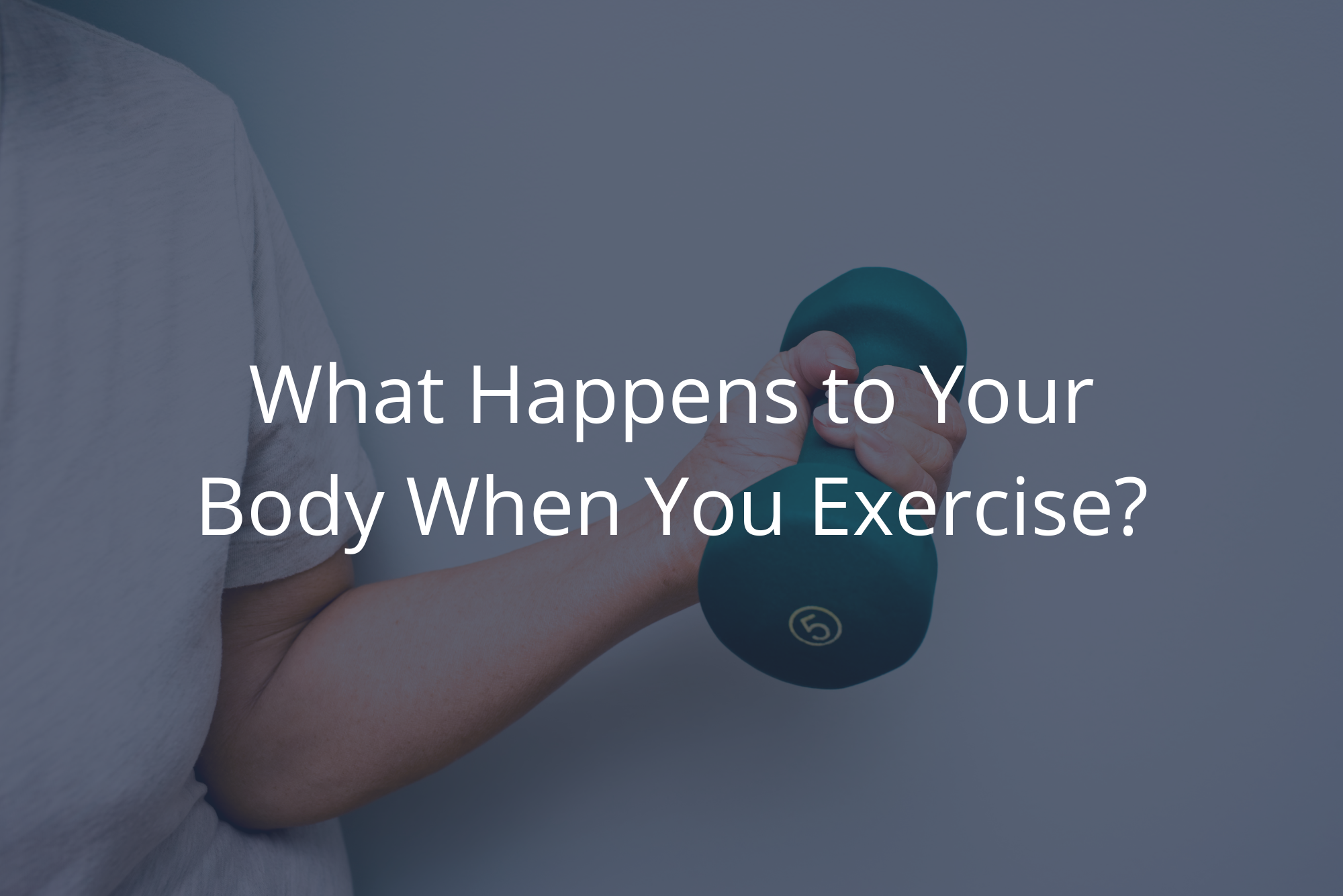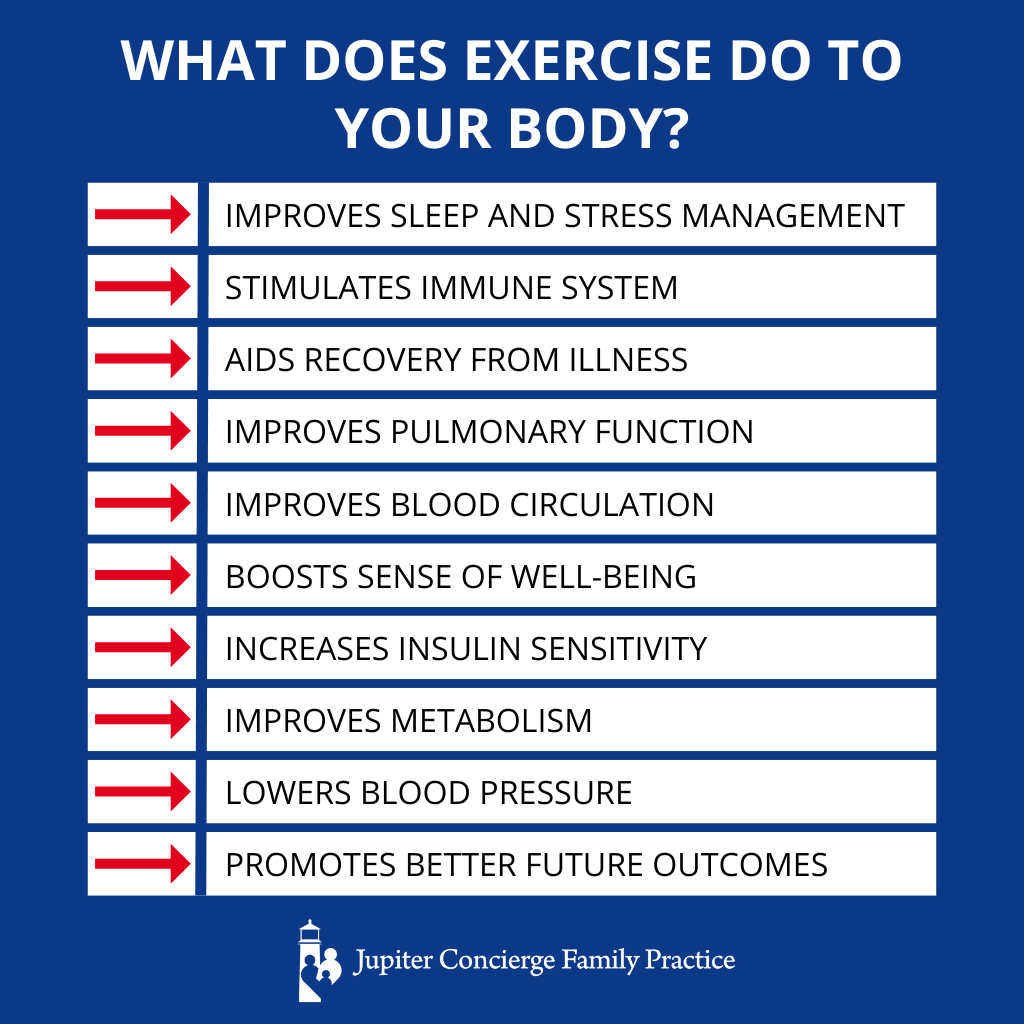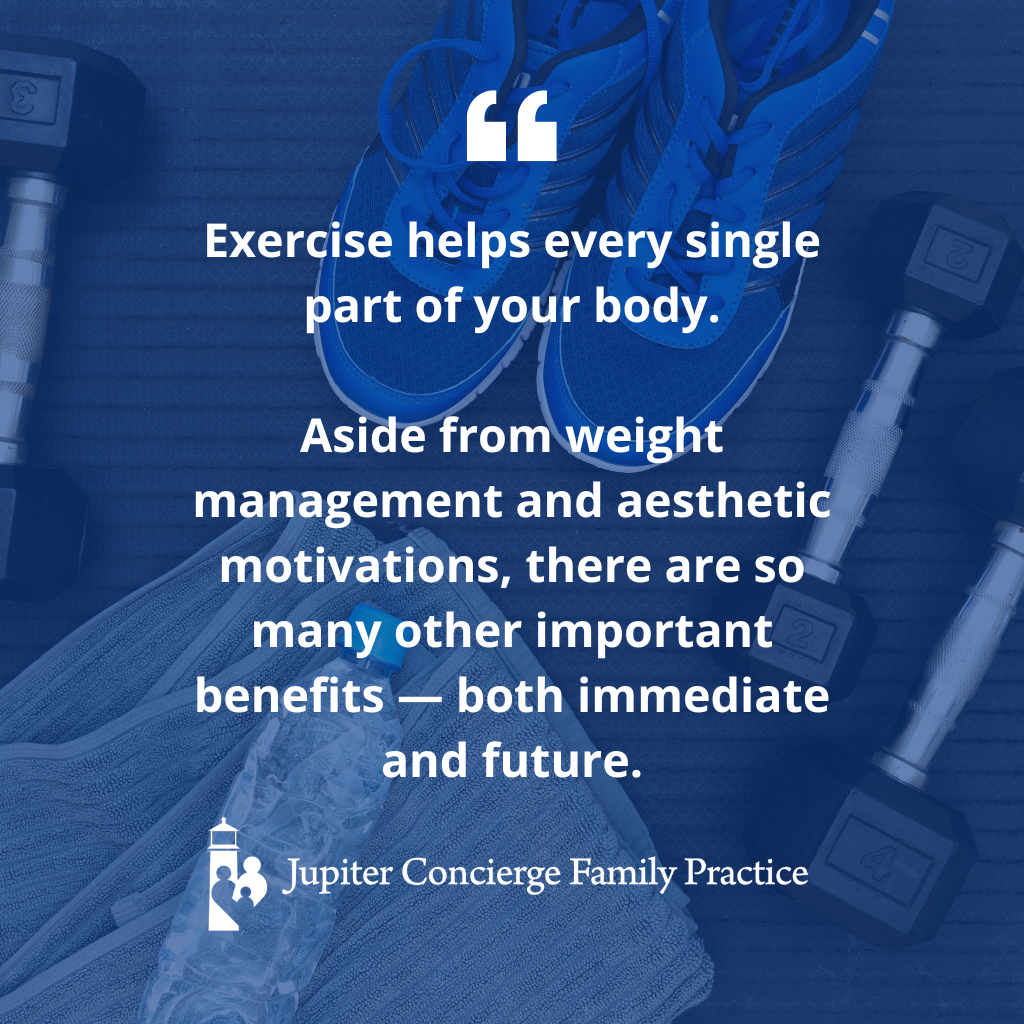
If you know me — or any physician for that matter — you’ve heard that exercise is an integral aspect of health and vibrancy. “Get plenty of exercise” has become a ubiquitous tidbit of advice we can easily, collectively ignore.
Why should you get plenty of exercise? What happens to your body when you exercise? What exactly goes on inside you?
Exercise helps every single part of your body. Aside from weight management and aesthetic motivations, there are so many other important benefits — both immediate and future. Today, I want to extol exercise’s virtues so you can appreciate what all the fuss is about.
What Happens to Your Body When You Exercise?
Exercise benefits human health in many (many!) ways, each of which could be a blog post on its own. Suffice to say that exercise is one of the Four Pillars of Health (along with sleep, nutrition, and stress elimination) that helps build a stable, enduring picture of wellness.
Here are the many roles exercise plays:
Improves Sleep and Stress Management
Exercise helps control cortisol and neurotransmitter levels (adrenaline and melatonin) throughout the day. That means you have better stress management and more regulated sleep at night.
Stimulates Immune System
When you exercise, you create small — but beneficial! — amounts of inflammation in your body. This inflammation sensitizes and strengthens your immune system to give you better resistance to illness.
Aids Recovery From Illness
Everybody gets sick sometimes. If you’re an avid exerciser, you’ll recover from illnesses more quickly. Illness results in decreased muscle tone, but exercise gives you a muscle tone buffer, making recovery easier.
Improves Pulmonary Function
The aerobic activity from exercise makes your lungs work harder to supply oxygen to the body. Over time, this leads to their becoming more efficient in ridding the body of carbon dioxide and taking in oxygen.
Improves Blood Circulation
The lungs aren’t the only organ working better thanks to exercise. The heart also becomes stronger and more efficient through physical activity. In fact, the entire circulatory system becomes more vibrant.
Not only does the heart muscle itself increase in efficiency, but the blood vessels also work better. When we exercise, we increase our muscle tone, which in turn keeps the veins healthy and reduces the risk of blood clots.
Boosts Sense of Well-Being
Exercise increases what we often call the “feel-good hormones” — dopamine and serotonin. When you have appropriate dopamine and serotonin levels, you have a better general sense of well-being.
Of course, exercise can also help you feel good about the way you look. Feeling comfortable with your body and liking what you see in the mirror can improve overall mood as well.
Increases Insulin Sensitivity
Insulin permits you to break down carbs and use them efficiently. Insulin production is based on a gene that gets up- and down-regulated. When you exercise, the communication between insulin and the body becomes more effective; your body needs less of it to get the job done.
This is critically important because insulin resistance is a precursor to diabetes. When you’re insulin resistant, your body has to make more insulin to get a response. And while insulin is a vital substance, it’s also inflammatory. You don’t want extra insulin floating about unused.
Improves Metabolism
Metabolism can be increased both by the improved insulin usage we just talked about and through exercise that burns fat preferentially. Targeting subcutaneous, central fat (the fat around the torso that makes the body look obese) can greatly improve many areas of health, including metabolism.
Lowers Blood Pressure
When you exercise, your blood pressure temporarily rises. This brief increase in pressure helps “exercise” your blood vessels’ elasticity, keeping them healthy and pliable. It also decreases “bad” cholesterol (LDL) and increases “good” cholesterol (HDL).
Promotes Better Future Outcomes
If all this weren’t enough, exercise also promises — and delivers! — future rewards. Exercising now will improve not only your current situation, but also your future health.
- Lowers risk of dementia. Exercise promotes circulation to, and oxygenation of, the brain.
- Lowers risk of developing osteoporosis. Weight-bearing exercise results in anabolism (creation) of bone and decreases catabolism (breakdown) of bone.
- Promotes independence in older age. A person who has a history of exercise and activity benefits from qualities like improved balance, reduced risk of fall and injury, increased muscle strength, and flexibility. Each of these improves health outcomes for seniors across the board.
It’s Never Too Late to Start (or Start Again)
If you don’t have a solid exercise routine, don’t despair! It’s never too late to start, regardless of your state of physical health. Various exercise strategies exist to help all kinds of people get moving.
Talk to your doctor about what exercise regimen makes sense for you so you don’t hurt yourself. And if you’ve fallen out of your movement routine, don’t beat yourself up; just climb back aboard. You can always start anew!

Dr. David Rosenberg
Dr. Rosenberg is a board-certified Family Physician. He received his medical degree from the University of Miami in 1988 and completed his residency in Family Medicine at The Washington Hospital in Washington, Pennsylvania in 1991. After practicing Emergency Medicine at Palm Beach Gardens Medical Center for two years, he started private practice in Jupiter, in 1993. He is an avid baseball fan and Beatles fanatic, since he was 8 years old. He has been married to his wife, Mary, since 1985 and has three grown children.
David completed additional studies at Mercer University, Macon, Georgia and obtained a BS in Chemistry in 1983.
“My interests include tennis, snow skiing, Pilates and self-development.”


